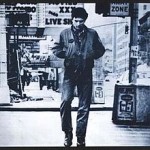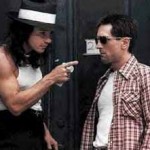Taxi Driver (1976)
Dir: Martin Scorsese
Stars: Robert DeNiro, Cybill Shepherd, Jodie Foster, Harvey Keitel and Albert Brooks
I’ve obviously seen this Scorsese masterpiece before, but like many top American films, I seem to take a new element or theme away from it with each new viewing. I know, plenty has been written and analyzed about this film prior to my little post here – so all I can do is give you my latest take! Hopefully, it’ll at least help motivate you to see this classic again.
For those of you unfamiliar with this title, it concerns the story of Travis Bickle, an ex-Marine who simply can’t sleep and spends most of his nights riding around Manhattan on buses and subways. He’s only 26, and as time will tell, he’s incredibly lonely. What makes this film and this character so relatable is that he wants what most of us want: to love and be loved. But poor Travis struggles with this desire, as demonstrated by a brief relationship with a Presidential campaign manager named Betsy (Cybill Shepherd.) As Travis’ voice over tells us, he saw her one day at the campaign headquarters and felt “they can not touch her.” You might be wondering, “who’s they?”
As we listen more to Travis’ thoughts in voice over and observe him writing in journals, it’s clear he’s having more and more trouble relating to people on any kind of agreeable plane. The guy is just plain awkward – he tries so hard! I mean, already he’s built this Betsy into a being that has an awful lot to live up to. Sure enough, he bravely approaches her during her work day, amongst her colleagues – including a wonderfully awkward and “silly” co-worker named Tom (Albert Brooks) – and actually gets her to agree to see him. He takes her for coffee and pie, which goes well. But the second date, during which he takes her to the porno movies, ends poorly as one might expect. One of the best shots in the film occurs right after this disastrous meeting: Travis is talking to Besty on the phone and trying to convince her to see him again. The conversation is obviously not going well – we’re hearing only Travis’ side as he chats with her on a pay phone. Anyhow, when he asks Betsy if she received his flowers, the camera moves slightly to the right, about six or eight feet until Travis is out of frame, and reveals a deserted, dingy, filthy hallway leading to the street. The conversation concludes and Travis disappears down the hallway and into the street, continuing his ongoing battle with solitude.
Just a little bit more on the story: the middle of the film focuses on all of the bizarre and upsetting things Travis witnesses as a taxi driver hauling folks all over the streets of New York. For example, a bearded man (Martin Scorsese) has the cabbie pull over to the side of the curb and keep the meter running as he describes to Travis how he’s going to murder his wife who’s cheating on him – then points her silhouette out for Travis in a second floor window! Travis decides to arm himself for whatever events he has conjured up in his mind. In another memorable scene, he meets with “Easy Eddie” in a disgusting motel room and buys not two, not three, but four pistols, including a .357 Magnum, which as Eddie advises, could be used to stop a charging elephant. We see Travis spending more time practicing with the guns, equipping himself with holsters and homemade contraptions so that he may carry all four at once. For what, pray tell? He even starts shadowing the Presidential candidate that Betsy was working for, Charles Palantine. Ruh roh…
The only other distraction for Travis is a very young prostitute named Easy, AKA Iris, played by Jodie Foster. She hops in his cab one night and demands to be “taken out of here.” But, her pimp, played with creepy confidence and bravado by Harvey Keitel, drags her out of the cab and tosses an atrocious looking $20 bill at Travis. Well, another night, Travis runs into Iris and decides to look her up the next day. Turns out she’s not even 13 yet and would very much like to get out of her current lifestyle – but only when she’s high. The resolution to the story I’ll leave for you to either remember or experience for yourself. But I’ll say this – do yourself a favor and have Anchorman: The Legend of Ron Burgundy on stand-by as the second film in your double feature – you’ll need it.
A few more observations about the film: Taxi Driver seems to be a nocturnal movie. Even when I think of the day time shots, there are few of them, and most of them occur indoors. Even Travis observes early on in the movie, “All the animals come out at night.” I don’t think this is an earth-shattering note, but I think it speaks volumes to Travis’ “arch,” or his journey from a bad mental and emotional place to an agreeable one by the end of the movie. We humans are meant to work during the day, have a bit of camaraderie with each other and enjoy life: poor Travis seems stuck living at night, alone and in a revolving door of despair.
Think of the use of voice over for a moment. It’s creepy to be let inside a character’s mind, much less one like Bickle, and DeNiro’s precise, specific delivery of Paul Schrader’s dialogue drives the film. I’m not sure Driver would have the same effect without its use of voice over. Now, I’m aware that a lot of screenwriting coaches and gurus insist that voice over is the kiss of death, but that’s what I like about Taxi Driver: if you were to watch the film on mute, you’d still be pretty concerned and/or frightened by Travis! The voice over is more of a supplement and not a highlight. Another thing I only picked up on during this viewing was how Iris’ Dad provides the final voice over. Think about it for a moment: when Betsy hops in the cab in the final scene, Travis has no voice over to offer us after he drops her off, does he? Again, he lands in an agreeable place to (hopefully) live the rest of his life in peace.
Other supplements to the story that contribute to the overall effectiveness of the picture include the music, cinematography and acting. Bernard Herrmann’s score provides the perfect mood for the romantic scenes with Betsy, the “touring” scenes with Travis driving around town and the crazy, bloody climax. The scenes with Bickle just driving around have tremendous shots of parts of the cab with the New York streets “scrolling” behind them. Herrmann’s marching tune accompanying these shots make you feel like Travis is making up his mind, biding his time, awaiting the best moment to clean them up. And I won’t even get into the acting. Yes, the supporting roles are a big part of why the movie works, but come on… You imitated DeNiro after you saw this movie the first time, I did, my friends did and continue to do so today – I still do “You talkin’ to me” by myself from time to time! There’s no getting around the fact that this was a stellar performance that has been mimicked and imitated countless times since its debut.
Note 1: Have a look at the trailer here – is that me or is it James Coburn providing the voice over??
Note 2: I gotta say what an incredible year 1976 was in film. We have Taxi Driver, sure, but we also have Rocky, Network, Carrie and All the President’s Men. Not too shabby, eh?!





